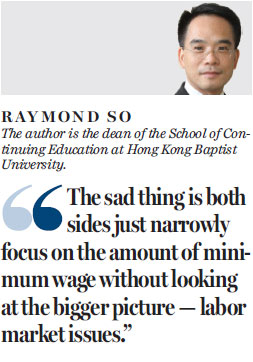Hong Kong must look beyond minimum wage to tackle its labor issues
Updated: 2016-10-14 07:19
By Raymond So(HK Edition)
|
|||||||||
The Minimum Wage Commission last week reached a consensus on the biennial adjustment of the statutory minimum wage. The new recommended minimum wage level is HK$34.5, which is HK$2 more than the current level. At the end of this month, the commission will submit a report to the government. According to these procedures, the recommended minimum wage will take effect next May.
The minimum wage level is reviewed and adjusted every two years. The review mechanism takes objective data into account. Both the employer and employee representatives take very different viewpoints; the rule of the game is that the scope of negotiation is well defined by the objective data. Hence, there is some room around the central point defined by the objective data. The unwritten rule is that both sides will follow this approach in the bargaining process.
Disagreement over the level of the minimum wage is not surprising. After all, the two sides always differ greatly in their standpoints. Nevertheless, this time round the review was more complicated and both sides fought a bitter battle. Both sides were not willing to yield this time. The normal practice of taking objective data into account was not observed. The employers started the negotiation by suggesting a zero increase in the minimum wage, while employees asked for a minimum pay of HK$40 per hour, up from the current level of HK$32.5. This is despite that the objective data clearly suggests an appropriate minimum wage level in between these two extremes. It is not surprising that both sides have resorted to a kind of bargain-down strategy. However, the wide gap between the demands of two sides does not make for constructive bargaining. This shows both sides are only concerned with their own agenda and do not take the views of the other side into consideration.

In the previous reviews, usually an agreement was ready by the end of September. If no consensus was reached by the two sides, the final decision would be handed down by the government. To both the employers and employees, leaving the decision to the government is unwise because their own voices will not be reflected when determining minimum wages. This time the consensus was reached very late, almost missing the deadline. Moreover, the agreement was a compromise, which indicates a great deal of effort has been made by the government during the lobbying process.
According to government statistics, last year only about 40,000 people, a very small proportion of the whole workforce, received the minimum wage. Hong Kong has a very high standard of living; it is clear that those who earn only the minimum wage can hardly afford a decent life for themselves and their families. Employers in the city have been frequently criticized for failing to allow these people to get a fair share of the benefits brought by economic development.
Nonetheless, from a business point of view, employers are not in a position to overpay employees; they only need to pay employees at prevailing market rates. The sharing of economic benefits is realized not through minimum wages but through economic progress which benefits all sectors. In addition, there is a well-known ripple effect induced by a higher minimum wage. Whenever those receiving a minimum wage get a pay rise, employers are under pressure to raise the wages of other employees. This will drive up overall wage levels.
The arguments put forward by employers and employees are old. The sad thing is both sides just narrowly focus on the amount of minimum wage without looking at the bigger picture - labor market issues. It is true that minimum wage is a big issue in the labor market. However, one cannot isolate the minimum wage from other issues in the labor market. We are facing several problems such as labor shortages and a mismatch of skills. But these are not covered during negotiations on the minimum wage. When people just focus on the level of the minimum wage, the arguments put forward by employers and employees simply reflect their own desires. If we maintain this mindset, it will not be surprising that we will hear the same set of arguments two years later.
(HK Edition 10/14/2016 page1)